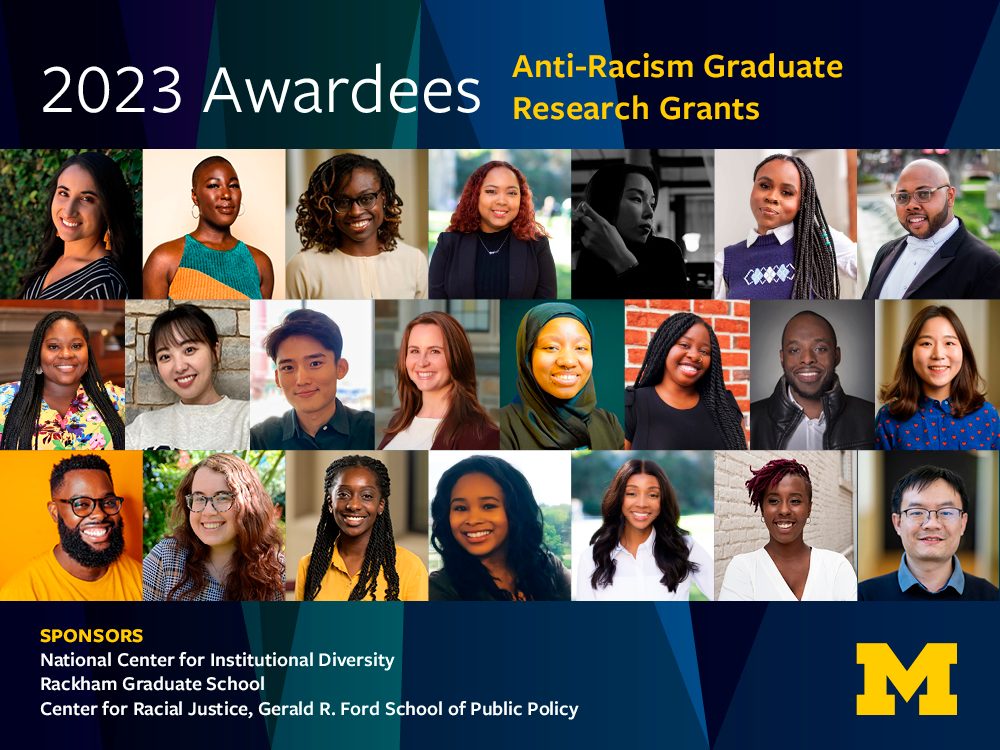
“Reproductive Justice as a Human Right”
June 21, 2023
Six faculty named 2023 Anti-Racism Research & Community Impact Faculty Fellows
June 29, 2023Anti-Racism Collaborative awards over $100,000 in Graduate Research Grants
June 27, 2023
The Anti-Racism Collaborative, administered by the National Center for Institutional Diversity (NCID), has awarded 21 summer research grants, totalling more than $100,000, to individuals and teams comprised of University of Michigan (U-M) graduate students.

“Graduate students make important contributions toward the advancement of innovative research and anti-racist principles,” says Elizabeth R. Cole, NCID director and University Diversity and Social Transformation Professor of Psychology and Women's and Gender Studies. “It’s critically important to provide resources that support this current generation of emerging anti-racism scholars.”
Along with the NCID, the student focused grant initiative is co-sponspored by the Rackham Graduate School and the Center for Racial Justice (CRJ) in the Gerald R. Ford School of Public Policy and aims to support research projects focused on racial inequality, racial equity, and racial justice while advancing graduate student progress toward degree. Additionally, the program provides ongoing professional development and support to the grantees.
"I am continually inspired by the innovation and insight that graduate students bring to pressing issues through their research and scholarship,” says Rackham Dean Mike Solomon. “And I am grateful that this ongoing partnership provides them an opportunity to pursue critical inquiry through the lens of racial justice."
Grant recipients include master's and doctoral students from a wide range of fields and disciplines, such as information science, women’s and gender studies, environmental justice, music theory, and education.
"The Center for Racial Justice is excited for our continued partnership with NCID and Rackham on this important initiative,” says Celeste Watkins-Hayes, CRJ Founding Director and pending Board of Regents’ approval, the next Dean of the Gerald R. Ford School of Public Policy. “The brilliance and ingenuity of our grantees cannot be overstated, and we are honored to support their development as scholars committed to anti-racism and racial equity."
The NCID, Rackham, and CRJ will host opportunities for the campus and broader communities to engage with award recipients and learn more about their research during the 2023–2024 academic year.
Collectively, these instances and the resulting protests reinvigorated the public discourse and raised longstanding questions about the presence of police in educational environments. In particular, reports about police violence and misconduct in schools, colleges, and universities resurfaced including the 2015 assault of a Black high school student by a school police officer in Columbia, South Carolina and shooting deaths of Samuel DuBose by University of Cincinnati police, also in 2015, and Jason Washington by Portland State University police in 2018. At the same time, many educational institutions issued public commitments to assess their police departments and, in some cases, discontinue relationships with municipal law enforcement. While reports of campus police violence has been predominated by instances of anti-Black racism, policing practices have also been evidenced in the misogyny and gender-antagonism of policing young women and girls sexual and reproductive health as well as legislative efforts to disenfranchise trans and nonbinary youth from full participation in civil society.
Now, three years after what has been described as American racial reckoning, even greater expenditures are being made on campus and municipal policing and educators continue to serve as campus surveillance personnel that facilitate police intervention. And yet, we who believe in freedom have continued to imagine the presence of possibilities for our collective safety on campus beyond the project of policing, what has been broadly referred to as campus abolition. We ask ourselves:
2023 Projects
‘Estamos bien:’ Interrogating the colonial demands for organizational resilience in federal grant participation at Puerto Rican Hispanic-Serving Institutions
Cassandra Arroyo (PhD Student in Higher Education)
This mixed methods study interrogates the ways in which colonial and racial violence are embedded in racialized federal funding programs that are positioned as meritocratic competitions and how this dictates the allocation of resources. This study contextualizes these conditions within Puerto Rico, which operates as an unincorporated territory of the United States: “belonging to, but not part of.” Although all nonprofit institutions in Puerto Rico qualify for Title V federal funding designed to support Hispanic-Serving Institutions (HSIs), it is unclear the extent to which these resources are accessed by or improve the institutional capacity of Puerto Rican colleges and universities.
“We’ve Got to Win This War:” Highlighting The Music of Four Black American Women
Lydia Bangura (PhD Student in Music Theory)
The music of Black Americans has historically been and continues to be excluded from syllabi, concert programs, and music research. Music that is both gendered and racialized (i.e. the music of Black women) continues to suffer from further erasure in music research. Therefore, in order to counter the racist and misogynistic musical histories that suppress Black women’s musical legacies, this project seeks to explore the manuscripts, pedagogical materials, and biographical information of four lesser-known Black women musicians. The research findings will be presented in an accessible podcast series, to encourage the inclusion of these women in the music classroom.
Strategies for Radical Healing: Examining Family Social Support as a Protective Factor for Adolescent Police Contact
Deaweh Benson (PhD Student in Developmental Psychology)
Adolescent police contact is associated with adverse mental and physical health outcomes. Due to systemic racism in policing, Black adolescents disproportionately experience police contact. Despite documented harmful outcomes, adolescent police contact persists throughout the American context. Research on protective factors that can ameliorate the link between police contact and poor health is necessary. The proposed study will adopt theoretical frameworks from biopsychosocial models of racism and radical healing to investigate whether family social support buffers police contact among Black adolescents (n= 1,069) sampled in the Future of Families Child and Wellbeing Study (FFCWS), a birth-cohort study of mostly low-income families.
